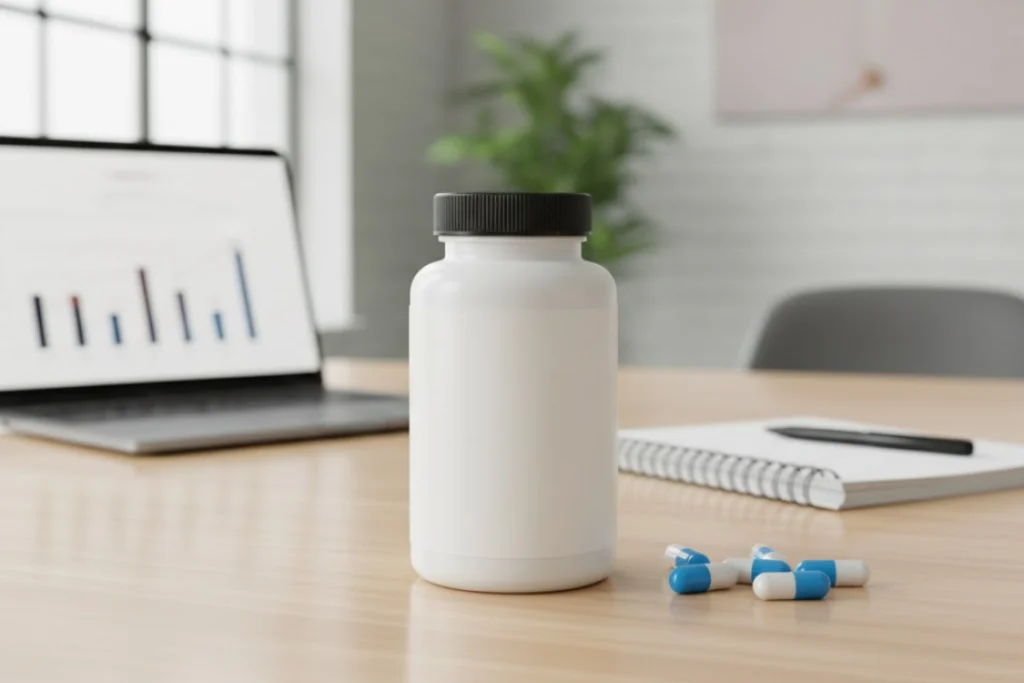Choosing the wrong manufacturing partner can lead to problems that go beyond financial losses. It can result in product recalls, supply interruptions, or enforcement actions from regulators. Conducting supplement manufacturing partner due diligence helps reduce these risks by confirming that a potential partner follows proper documentation, process controls, and compliance standards.
In the dietary supplement industry, due diligence involves reviewing how a manufacturer manages regulatory compliance, manufacturing processes, quality standards, raw material sourcing, and financial stability. Neglecting this process can increase the risk of mislabeled products, late shipments, or penalties from the Food and Drug Administration (FDA) or Federal Trade Commission (FTC). These issues can damage a brand’s reputation and weaken customer loyalty.
While supplements are not approved by the FDA before they reach the market, brand owners must still comply with the Federal Food, Drug, and Cosmetic Act (FD&C Act) and the Dietary Supplement Health and Education Act (DSHEA). Every contract manufacturer in the United States must register its facility with the FDA and follow current Good Manufacturing Practices (cGMP) under 21 CFR (Code of Federal Regulations) Part 111. The FDA oversees compliance through inspections and adverse-event reporting. However, the brand remains responsible for ensuring its products meet applicable regulatory requirements and are accurately labeled.
Effective due diligence verifies documentation such as standard operating procedures (SOPs), certificates, and test reports. This evidence-based approach helps reduce operational and compliance risks before a contract is signed.
What Does Due Diligence Mean in Supplement Manufacturing?
Due diligence in supplement manufacturing is the process of confirming that a contract manufacturing partner operates legally, ethically, and in accordance with regulatory standards. It ensures the manufacturer’s controls align with recognized good manufacturing practices and that business operations are stable enough to support consistent production. A careful review helps brand owners select experienced manufacturers capable of maintaining product quality and compliance within the supplement industry.
Understanding Compliance, Ownership, and Reputation Checks
Compliance verification should begin with documentation. Confirm the manufacturer’s FDA registration number and verify their compliance with 21 CFR Part 111, which outlines cGMP expectations. Request copies of relevant certifications, such as NSF (National Sanitation Foundation), UL (Underwriters Laboratories), USP (United States Pharmacopeia), or NPA (Natural Products Association), and reports from third-party audits. These indicate that the manufacturer’s systems for identity, purity, and composition meet recognized quality control standards.
Next, confirm ownership and legal structure. Identify the legal entity, review intellectual property agreements like NDAs (Non-Disclosure Agreements) and Quality Agreements, and clarify who owns any proprietary formulations. Financial transparency is equally important. Review insurance coverage and financial statements to ensure the manufacturing partner can meet contractual and production obligations without disruption.
Finally, review reputation and history. Request FDA inspection summaries, client references, and recall or complaint reports. Look for evidence that the manufacturer handled corrective and preventive actions (CAPAs) responsibly. A record of unresolved compliance issues may signal systemic weaknesses.
Why Business Transparency and Financial Stability Matter
Financially stable manufacturers are better equipped to avoid production interruptions caused by raw material shortages or supply chain issues. Review basic financial information, payment practices, and credit stability to assess their ability to maintain production during changing market conditions.
Transparency often signals how reliable a manufacturer truly is. Supplement manufacturers that allow facility tours (virtual or in-person), name a direct quality assurance contact, and share testing data for verification tend to operate with stronger accountability. Openness about their manufacturing processes, sourcing records, and quality standards helps brand owners evaluate whether the partnership aligns with their operational expectations.
When assessing transparency, consider asking:
- What was your on-time-in-full (OTIF) delivery rate last year, and what contributed to any missed targets?
- What percentage of lots required CAPAs in the past 12 months?
- When was your last recall drill conducted, and what improvements were identified afterward?
These questions focus on operational consistency and preparedness rather than performance claims.

How to Conduct a Supplement Manufacturer Review
Performing supplement manufacturing partner due diligence involves examining a manufacturer’s documents, audit records, and compliance background. This step confirms FDA guideline adherence and quality consistency. A thorough review before signing helps prevent confusion about scope or responsibility.
What Records to Request Before Signing
Ask for these essential records to verify compliance and production readiness:
- FDA registration confirmation and current cGMP certificate (21 CFR Part 111).
- Copies of third-party certifications, such as NSF, UL, USP, or NPA, when available.
- A draft Quality Agreement detailing testing responsibilities, complaint handling, and change control.
- A label compliance pack showing example labels, required statements, and a claims review confirming that no unauthorized health claims are present.
- A supplier qualification SOP and supporting documentation that defines raw material sourcing and purity requirements.
- Certificates of Analysis (COAs) for raw material and finished products, supported by reports from independent testing labs.
- Stability testing data confirming that expiration or shelf-life dating is supported by documented results.
- Batch record templates and traceability documentation showing how materials move through production.
- Capacity data and production capabilities, including scalability and lead times.
- An itemized quote outlining unit pricing, minimum order quantities, testing, packaging, and freight terms.
How to Check Regulatory and Legal Histories
Before entering a partnership, verify the manufacturer’s regulatory track record. Reviewing available data ensures they meet regulatory standards and have resolved any prior compliance issues.
Key steps include:
- Reviewing FDA inspection results and asking for the most recent 483 or Establishment Inspection Report (EIR) along with CAPA documentation.
- Confirming that there are no unresolved warning letters, consent decrees, or pending litigation.
- Checking for an active adverse-event monitoring procedure and corresponding annual reports.
- Ensuring their labeling practices align with DSHEA, FD&C, and FTC rules to prevent misleading representations.
Red flags include withheld COAs, missing documentation, refusal to allow facility access, unclear specifications, or cases where a broker poses as the manufacturer.

How to Evaluate Operational and Quality Systems
Evaluating internal processes helps confirm that a contract manufacturing partner has strong systems for quality control and regulatory compliance. This reduces the risk of compliance issues or operational setbacks that could affect production or labeling accuracy.
What Internal Controls and Audits Should Be in Place?
Reliable supplement manufacturers maintain structured internal audits and regular third-party audits. Ask how often audits are conducted, how corrective actions are tracked, and how staff are trained on good manufacturing practices.
Supplier management should include documented qualification procedures, requalification cycles, and transparency around ingredient sourcing. Mock recall programs, FEFO (First-Expired, First-Out) inventory tracking, and traceability from input to finished products show the manufacturer’s readiness to address quality problems if they occur.
For private label supplements or custom formulations, request documentation of their technical capabilities, pilot-run processes, and R&D support functions. Reviewing anonymized audit findings can help confirm that issues are identified and resolved promptly.
How to Validate Quality Assurance (QA) and Testing Reports
Testing reports are central to verifying product quality. A compliant manufacturer provides full transparency into how they test ingredients and finished goods. These records help confirm that the facility meets FDA regulations and safety standards.
Core items to review include:
- Raw material testing reports verifying identity, purity, and limits for contaminants such as heavy metals or microbes.
- In-process testing logs for blend uniformity, weight checks, and disintegration (where applicable).
- Finished product testing summaries confirming conformance to product specifications, with accredited COAs.
- Independent third-party audits or lab reports that confirm label accuracy and regulatory compliance.
- Stability testing data supporting expiration and shelf life under proper storage conditions.
All documentation should align with FDA and DSHEA requirements and avoid making medical or disease treatment claims.

Your Final Due Diligence Checklist for Supplement Manufacturing Partners
Regulatory & Compliance
- FDA facility registration and current cGMP (21 CFR 111) certificate
- NSF (National Sanitation Foundation), UL (Underwriters Laboratories), USP (United States Pharmacopeia), or NPA (Natural Products Association) third-party certifications
- Draft Quality Agreement with NDA and IP protections
- Label pack with Supplement Facts and compliant claims review
Quality & Traceability
- Supplier qualification SOP and approved vendor list
- Traceability plan and recall drill documentation
- Certificates of Analysis (COAs) for each batch verifying identity, potency, microbial limits, and heavy metals
- Independent lab reports validating label accuracy
- Stability data supporting expiration dating
- Adverse-event SOP and monitoring summary
Operations & Production
- R&D documentation for formulation and pilot runs
- Capacity and surge production plans
- Scalability for capsules, tablets, powders, gummies, and liquids
- Transparent, itemized pricing
- Internal and external audit summaries with CAPA (Corrective and Preventive Action) evidence
Performance & Business Stability
- OTIF (On-Time-In-Full) metrics and performance indicators
- Financial documentation and trade references
- Retailer readiness credentials (e.g., NSF or Amazon requirements)
- Defined communication plan and escalation process
- Post-production support documentation

Building a Compliant, Trustworthy Manufacturing Partnership
Supplement manufacturing partner due diligence requires more than surface-level research. It involves verifying legal registration, audit history, documentation practices, and financial stability. Ensuring that a contract manufacturer complies with current good manufacturing practices and regulatory standards protects both your product and your reputation. Transparent communication, validated documentation, and consistent compliance practices form the foundation of a reliable and successful partnership.
Frequently Asked Questions
What is manufacturing due diligence?
It is the process of confirming a supplement manufacturing partner’s compliance, operational reliability, and documentation before entering a contract.
How do I verify a supplement company’s certifications?
Request their FDA registration number, cGMP certificate under 21 CFR Part 111, and independent third-party certifications such as NSF, UL, or USP.
How can I check if a manufacturer has past violations?
Search the FDA database for inspection results, 483 observations, or warning letters, and request their corrective action records.
What documents are included in a due diligence review?
Documents typically include FDA registration proof, Quality Agreements, supplier SOPs, COAs, stability testing data, and audit reports.
What happens if I skip due diligence?
Skipping due diligence can increase the risk of compliance issues, product recalls, or financial loss due to supplier or manufacturing failures.
References
- Code of Federal Regulations. (2025, September 29). Title 21, Part 111—Current good manufacturing practice in manufacturing, packaging, labeling, or holding operations for dietary supplements. Electronic Code of Federal Regulations. https://www.ecfr.gov/current/title-21/chapter-I/subchapter-B/part-111
- Food and Drug Administration. (2017, December 23). Search registration and listing. U.S. Department of Health and Human Services. https://www.fda.gov/medical-devices/device-registration-and-listing/search-registration-and-listing
- Food and Drug Administration. (2020, January 9). FDA Form 483 frequently asked questions. U.S. Department of Health and Human Services. https://www.fda.gov/inspections-compliance-enforcement-and-criminal-investigations/inspection-references/fda-form-483-frequently-asked-questions
- Food and Drug Administration. (2024, October 1). Dietary supplements. U.S. Department of Health and Human Services. https://www.fda.gov/food/dietary-supplements
- National Products Association. (n.d.). Natural Products Association. https://www.npanational.org/
- NSF International. (n.d.). NSF International. https://www.nsf.org/
- UL Solutions. (n.d.). Dietary supplement testing and compliance services. https://www.ul.com/services/dietary-supplement-testing-and-compliance-services
- United States Pharmacopeia. (n.d.). USP: The United States Pharmacopeia. https://www.usp.org/



